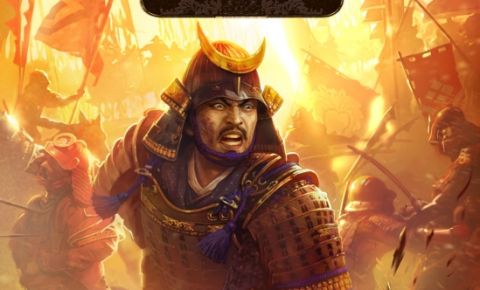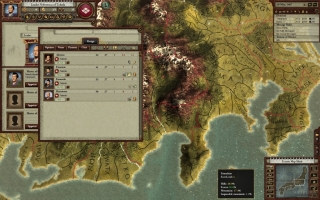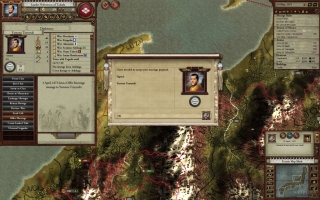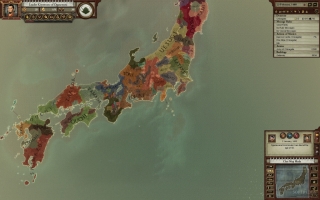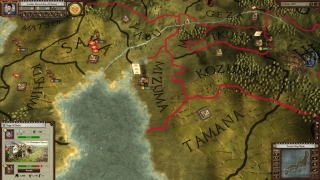Give a Western gamer a strategy map and the option to recruit armies and he will go on a killing spree and try to fight his way to domination. Paradox Interactive, through its grand strategy game like Europa Universalis and Victoria, has sought to take the focus away from pure warfare and move it towards economy, diplomacy, espionage and long term strategy.
Their most recent release, Sengoku, is based on the history of feudal Japan and is the rare game which manages to actually make war unpalatable, mainly because it often is the worst way of achieving objectives. It's much easier to sow intrigue and wait for someone to die without heirs to get some territory than to get an army and force someone to come to the peace negotiations table and cede it.
Story
In true Paradox Interactive fashion the player is allowed to take control of any of the simulated clans that populate Japan during the Country at War period, when central authority was very weak and a number of local leaders known as Daimyo managed to control large portions of the country and fight for the title of Shogun.
The setting is pretty much the same as that of Total War: Shogun 2 but there's much greater detail to Sengoku, from the number of provinces included to the number of characters that live their lives inside the game and the actions that each can perform to further his power or to destroy his enemies.
As the leader of the clan the gamer needs to carefully evaluate his resources and then use them wisely in order to push his interests forward, trying to become the first one to control enough of Japan to become Shogun and then show that he has the ability to keep control over the country.
The game does not cast the player as the leader of a clan but rather as the mystical power behind the throne, with generals, spouses, children, ronin, ninja and other advisers the pawns that must be guided in order to achieve long term, historical objectives.
As with other grand strategy games from Paradox Interactive there's a lot of choice here, which means that there's no actual narrative created by the developers themselves. Games can turn out wildly different even when choosing the same clan and pursuing pretty much the same strategy which makes Sengoku a gold mine for the type of player that is interested in creating and telling his own story of conquest, betrayal, rise to power or downfall.
Gameplay
Grand strategy means that the player is in charge of every aspect of a faction which is engaged in a major conflict and can guide its destiny over a long time period. For Sengoku this means that the player runs a Japanese clan, small or big, for the entire Country at War period with the option to conduct diplomacy, begin wars, conduct peace negotiations, hire ninja and ronin, develop provinces, engage in personal relations with other clans and gain honor.
The ultimate aim of Sengoku is to get more than half of Japan and get the Shogun title and this will require doing all of the above and more.
The big and wise decision that the developers at Paradox have made is not even trying to make actual military conflict an interesting mechanics in Sengoku. There are no real time tactical battles, no beautifully rendered units, no nice animations, just small figures clashing on screen as numbers dwindle.
Those who are interested in the differences between ashigaru and samurai and want to create complex battle plans have the option to migrate to Total War: Shogun 2 at any point. Those who want intrigue, plans that span decades and betrayals can stick to Sengoku.
Everything the player can do is powered by money and by honor. This final and more abstract resource is the most important in the game and players should carefully weight all decisions which have to do with it. Even if it means losing money take the options which offer a bonus, preferable large and immediate, to honor.
Honor is gained by controlling more provinces and giving them to vassals and by paying the price of a gift to the Emperor and there's also the option to join the Shinto religion in order to get more (Buddha inspires warrior monks while Christianity offers followers firearms). It can be used on everything from creating plots to diplomatic dealings and getting a constant supply of it quickly becomes an obsession in Sengoku.
The people living in Japan lie at the core of the game. Not the downtrodden peasants and not even the brave samurai are really interesting, though. The game is only interested in those who are driven to acquire and hold power, those who can occupy position in a hierarchy and then expand their power. This is the real heart of Sengoku: watching how characters interact, grow, gain ambitions and traits, die and then their offspring enter the same beautiful and ultimately deadly dance built around honor.
The one problem is that it can be hard for us, Western players, to maintain the focus needed to play Sengoku effectively. I sometimes found myself starting stupid little wars just because I felt I needed to do something while my honor went up enough to start another plot. This is the kind of game that marries some periods of inaction with crucial moments when the destiny of one faction can be solved in a few months and that's something that can attract but also put off a number of players.
Graphics and audio
Paradox Interactive has done a great job with both the actual graphics and the art style used in Sengoku. The first thing one sees once starting a game is a beautiful map of Japan, with complex textures and some nice water effects. As always the most devoted of players will spend most of the time in the informative and very necessary map views, from political to diplomatic, but it's good to see an effort to make the game appeal to a wider audience.
The art style also managed to evoke medieval Japan and it's always good to see small flourishes in the various panels. One problem is that, for a game which relies on characters for most of its actions, the various people are very similar in terms of looks, making it difficult to determine who does what at a glance, without hovering to see a name.
Paradox has also done a good job of further cleaning up their User Interface, which has been one problem for their grand strategy games, with the highlight being the two notification areas that are sitting just above the mini map in the low right hand corner of the screen. It's easy to get important information quickly, which is crucial for such a complex game.
As it usually is the case with Paradox the sound design is nothing to praise but it does the job nicely. The music is well suited to the theme and accompanies plots and assassinations very well but make sure to turn up the FX volume in the Options screen in order to make sure that you do not miss any important notification.
Multiplayer
It's pretty easy to create a multiplayer game of Sengoku and, as long as everyone is ready to put in the time and the effort, actually plotting outside the game to take down one particularly successful opponent is much funnier than working on the same goal with the Artificial Intelligence.
In other grand strategy titles, like Victoria II or Hearts of Iron III, it's easy to get enough players to fill the big powers but the variety of clans included in Sengoku might make a bit more difficult for players to get where all major and medium sized players are controlled by humans.
The Good
- Focus on characters
- Limited warfare
- Improved interface
The Bad
- Learning curve
- Can become overwhelming
- Plots are not effective
Conclusion
Unfortunately Sengoku is also a game that can feel aimless and barren. It would have probably helped if Paradox would have offered some kind of goal system for the clans, helping players to push forward towards some sort of objective instead of offering them all the possibilities and no incentive to pick one over the other.
As always when Paradox Interactive is involved players should wait for a few patches and should check out the official forums to see what changes they can expect for Sengoku and how those can affect their buying decision.
That being said Sengoku is mostly a good game that is recommended for strategy lovers and history buffs and can offer a nice alternative take on Medieval Japan for any fans of Total War: Shogun 2.
 14 DAY TRIAL //
14 DAY TRIAL // 